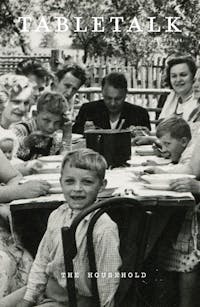
Request your free, three-month trial to Tabletalk magazine. You’ll receive the print issue monthly and gain immediate digital access to decades of archives. This trial is risk-free. No credit card required.
Try Tabletalk NowAlready receive Tabletalk magazine every month?
Verify your email address to gain unlimited access.
While Scripture has much to say about individual households, it tells us also that ultimately there is only one eternal household, the household of God, which is the church (1 Peter 4:17). In the consummation of all things, the only household that will continue is the household consisting of the redeemed people of God from every generation, dwelling together forever as children of God in the new heaven and new earth.
This household was established in the garden of Eden with Adam serving as our family head under the covenant of works (Gen. 2:16–17). He failed to offer the necessary obedience to lead us into eschatological life, instead bringing us all into an estate of sin and misery in his first transgression. Nevertheless, God was pleased to establish a second covenant, the covenant of grace (3:15). He further revealed His plans for His covenant people by establishing a covenant with Abraham, an administration of this covenant of grace, promising him, “In you all the families of the earth shall be blessed” (12:3). This is the same covenant household God established in the beginning, and it will endure through all eternity.
In God’s wisdom, this eschatological household is a diverse body, comprising members from every nation, tribe, people, and language (Rev. 7:9). Christ has destroyed every ethnic and sociological distinction the world establishes to erect barriers among people. In the ancient church, the most significant barrier was between Jews and gentiles. Christ has torn down even that dividing wall, creating one new man in Him (Eph. 2:14–15). Everyone who believes in Christ for salvation will be saved and brought into this household. These have the same faith as their spiritual father, Abraham (Rom. 4:12; Gal. 3:29).
Each of God’s people is adopted into this household. We do not exist within it naturally or according to our own merits. We are adopted members of this household. We have a full legal right to all the privileges and inheritance of the sons of God, yet we also share a spiritual family resemblance. We each come to bear the likeness of our Savior, Jesus Christ. In His foreknowledge, God has predestinated His people “to be conformed to the image of his Son, so that he might be the firstborn among many brothers” (Rom. 8:29).
This is the eschatological household of God, which we experience now in part through the visible church (1 Tim. 3:15). But until He returns, our life is hidden in God. All God’s people are presently found in Christ, and since He ascended and has not yet been revealed in His consummate glory, our consummate identities likewise remain hidden, or veiled, for a time (Col. 3:1–4).
While we earnestly await the return of our Lord and the revelation of what we will one day become, we nevertheless experience these spiritual blessings presently (Eph. 1:3). We have been redeemed by Christ and raised with Him in the inner man. He has entered the Most Holy Place in the highest heavens, and we worship Him there by the power of the Spirit (Heb. 9:24). By His Spirit, Christ is preparing this household for His return. This work has already begun, and the Lord will see it to completion (Phil. 1:6).

When Christ returns, His church will be entirely purified and cleansed from all iniquity. He will make us suitable for everlasting fellowship with the triune God. When we see our Savior returning on the clouds, we will be like Him (1 Thess. 4:16–17; 1 John 3:2), being raised from the dead unto spiritual bodies (1 Cor. 15:42–49) to enjoy full fellowship with the Lord face-to-face forever (2 Cor. 3:18). Certainly, we worship now even in the heavenly places, but we worship in local congregations on the Lord’s Day, one day in seven. When Christ returns, we will worship as a universal assembly of God’s elect, at the consummate Mount Zion (Isa. 2:2–4; Mic. 4:1–2) on an eternal Sabbath (Heb. 4:9).
Until that day, let us rejoice in the household of faith. Though it is not yet fully realized, the fellowship that we have with one another in Christ through the Holy Spirit is the same fellowship we will have in eternity.
